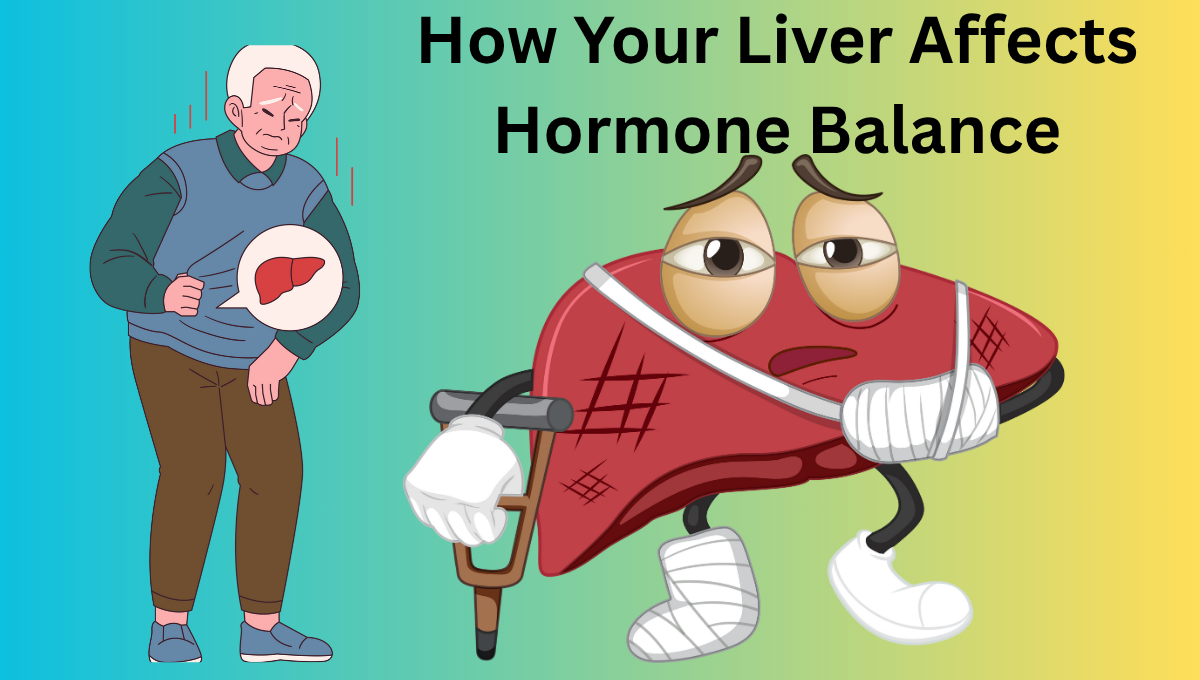How Your Liver Affects Hormone Balance
Overview of the Liver’s Function in the Endocrine System
When individuals consider hormones, they typically associate them with glands such as the thyroid, ovaries, or adrenal glands. However, there is an underappreciated entity that warrants greater recognition: the liver. Although its primary reputation is derived from detoxifying the body and metabolizing nutrients, the liver also functions as a discreet regulator of hormones. Impaired liver function can rapidly disrupt hormonal equilibrium.
Comprehending Hormones and the Significance of Equilibrium
Hormones function as the body’s messengers—minute chemical impulses that traverse the bloodstream, instructing tissues and organs on their actions. Hormones affect practically every aspect, including energy levels, emotions, and metabolism. The liver is essential for ensuring that these signals are precise, untainted, and appropriately transient.

The Role of the Liver in Hormonal Metabolism
Regulation of Estrogen
One of the liver’s primary hormone-related functions is the metabolism of surplus estrogen. This hormone is produced endogenously; however, when it is not metabolized effectively, it may result in estrogen dominance—a condition associated with weight gain, premenstrual syndrome, mood fluctuations, and perhaps breast cancer.
Conversion of Thyroid Hormones
The thyroid predominantly synthesizes T4, an inactive variant of thyroid hormone. The liver facilitates the conversion of T4 into T3, the biologically active form utilized by cells. In the absence of an adequately functioning liver, this essential conversion is impeded, resulting in weariness, cognitive impairment, and weight gain.
Insulin Sensitivity and Glycemic Regulation
The liver facilitates the storage and release of glucose in response to insulin. When this equilibrium is disrupted—often as a result of a fatty or slow liver—insulin resistance may develop, leading to type 2 diabetes and polycystic ovary syndrome (PCOS).
Detoxification of Cortisol and Stress Hormones
Once cortisol fulfills its function in aiding the body’s stress response, it must be eliminated. The liver metabolizes and removes surplus cortisol, preventing the chronicity of the stress reaction.
The Liver and the Estrogen Dominance Conundrum
Estrogen Metabolic Pathways (Phase I and II Detoxification)
Estrogen undergoes degradation via two steps of hepatic detoxification:
Phase I alters the estrogen molecule.
Phase II conjugates it with other molecules for excretion via bile or urine.
When this mechanism is inefficient, detrimental estrogen metabolites accumulate, resulting in imbalance.
Indicators of Inadequate Estrogen Clearance:
Profuse Menstrual Bleeding
Mammary sensitivity
Abdominal distension
Emotional fluctuations
Adipose accumulation in the hip and thigh regions
The Mechanism by Which Liver Dysfunction Induces Hormonal Imbalances in Both Women and Men
In females, it may lead to premenstrual syndrome, polycystic ovary syndrome, or uterine fibroids. In males, inadequate estrogen clearance may result in diminished testosterone levels, gynecomastia, and reduced libido.
 The Relationship Between Hepatic and Thyroid Function
The Relationship Between Hepatic and Thyroid Function
Conversion of T4 to T3 in the Liver
As much as 60% of the conversion of T4 to T3 occurs in the liver. When the liver is overloaded with toxins or fat, this process significantly decelerates.
Consequences of Hepatic Deceleration
You get fatigue despite obtaining 8 hours of sleep.
You readily accumulate weight.
You experience difficulty with focus.
Your hair begins to thin.
The Liver’s Function in Blood Glucose and Insulin Regulation: The Liver as a Glucose Reservoir
Upon a decline in blood sugar levels, the liver liberates glucose from glycogen reserves. It also plays a crucial function in gluconeogenesis, synthesizing new glucose when required.
Insulin Resistance and Hepatic Steatosis
When the liver is inundated with fat, its response to insulin is impaired. This results in elevated blood sugar levels and increased insulin in the bloodstream, creating a perilous scenario for hormonal imbalance.
Detoxification: Eliminating Depleted Hormones
Explanation of Phase I and Phase II Liver Detoxification Detoxification: Engages deleterious substances
Phase II Detox: Facilitates neutralization for secure excretion.
In the absence of optimum functioning of both, there is a risk of harmful estrogen accumulation and hormone receptor resistance.
Toxins, xenoestrogens, and hormone analogs
The liver filters xenoestrogens—synthetic estrogens included in plastics, insecticides, and personal care goods. These can usurp hormone receptors, exacerbating the imbalance.
Indicators That Your Liver May Be Influencing Your Hormones
Persistent tiredness
Unaccounted weight increase
Menstrual irregularities or infertility
Emotional fluctuations and apprehension
Reduced libido
Facial edema or fluid retention

Methods to Naturally Enhance Liver Function
Foods That Facilitate Hepatic Detoxification
Cruciferous vegetables include broccoli, kale, and Brussels sprouts.
Citrus-infused water
Allium species
Beta vulgaris and Daucus carota
Curcuma longa with Zingiber officinale
Guidelines for Hormonal Equilibrium
Minimize consumption of alcohol and sweets
Eliminate endocrine-disrupting substances
Obtain 7 to 9 hours of sleep nightly.
Engage in daily stress management practices.
Herbs and Supplements for Hepatic Support: Milk Thistle
Taraxacum officinale root
N-Acetylcysteine (NAC)
Alpha-lipoic acid
Extract of artichoke
When to Pursue Medical Assistance for Liver-Hormonal Disorders
If you are encountering persistent symptoms such as exhaustion, weight gain, or irregular cycles, and natural remedies are ineffective, it is advisable to consult a healthcare professional. Blood analyses, hormonal assessments, and hepatic function evaluations can offer elucidation.
Concluding Remarks
Your liver is not merely a detoxification organ; it is a hormonal conductor, orchestrating your endocrine system with accuracy. When functioning optimally, your hormones remain regulated. However, when subjected to pressure, the entire symphony of your body may become discordant.
Frequently Asked Questions
1. Can hepatic disorders induce hormonal acne?
Affirmative. Impaired estrogen clearance may exacerbate acne, particularly in the chin and jawline regions.
2. Can fatty liver be reversed via dietary modifications and physical activity?
In numerous instances, affirmative. Weight reduction, a nutritious diet, and consistent physical activity can ameliorate early-stage fatty liver disease.
3. Does milk thistle regulate hormones?
It facilitates liver detoxification, which may indirectly assist in balancing estrogen, cortisol, and insulin levels.
4. How can I determine if my liver is responsible for hormonal imbalances?
Monitor for symptoms such as exhaustion, diminished libido, abnormal menstrual periods, or mood fluctuations. A liver function test can provide confirmation.
5. Does hormone replacement treatment (HRT) impact hepatic function?
Affirmative. Hormone replacement therapy elevates the liver’s burden in metabolizing synthetic hormones. Consistently seek your physician’s guidance for secure oversight.

